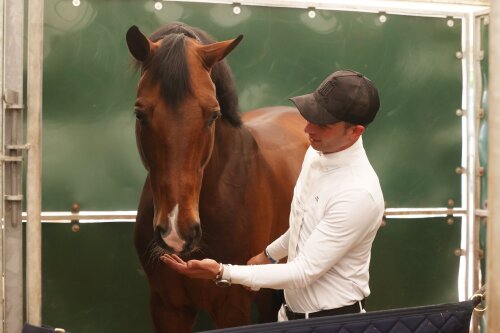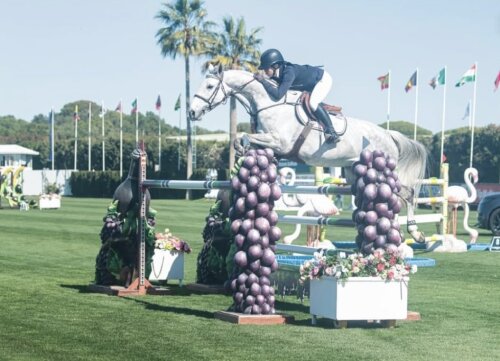Discussions on the proposed Rules revisions for Endurance, the future of Reining as an FEI discipline and a general Rules session were the key focus for debate at the FEI General Assembly in Moscow (RUS) today.
FEI Vice President Mark Samuel, who has acted as FEI Board liaison on the Endurance Temporary Committee (ETC) charged with a full review of the discipline’s Rules, was moderator for the dedicated Endurance session and was uncompromising in his message to delegates on the critical importance of the ETC’s work and tomorrow’s vote.
“This journey has been a sacred trust”, he said in his opening. “The status quo was clearly unacceptable. It is the time now for action rather than more words. Our partner, the horse is counting on us.”
Along with the feedback received as part of the consultation process, there was further input from National Federations at yesterday’s Regional Group meetings. As a result, the ETC made additional revisions to the proposed Rules which will be voted on at the General Assembly tomorrow, and these were explained in detail by Committee Chair Dr Sarah Coombs.
She too stressed the importance of horse welfare and the level playing field: “The welfare of the horse is our number one priority: not competition, not commercial or business interests and not administrative convenience. Every one of us is bound by the Code of Conduct for the welfare of the horse. This requires that we respect the horse during and outside competition, above all else.
“The use of illicit drugs is an abuse of the welfare of the horse. Clean Sport is a fundamental aspect of the contract to participate in FEI competitions. Where the use of banned substances and controlled medication and in particular the widespread use of nerve desensitisation has come into our sport it must be rigorously dealt with.”
Multiple topics were raised on the proposed amendments during the session, which was allowed to exceed its allotted three-hour slot to allow for all points of view to be aired. Minimum athlete weight, qualifications, ride distances, novice rides, rotation of Officials, change of trainers and the date of implementation should the Rules be approved were all debated at length.
Tomorrow’s vote on the overall approval of the Endurance Rules, which will include the date of implementation in 2020, and with the option to vote on individual provisions separately, will only be taken once the additional proposed amendments have been voted on.
The day’s sessions opened with debate on the Future of Reining. Discussion focused on a new Cooperation Agreement between the FEI and the National Reining Horse Association (NRHA) as well as Key Performance Indicators (KPIs) aimed at ensuring the sustainable growth of the discipline over the next four years if it remains in the FEI. The Agreement sets out the parameters of the partnership regarding jurisdiction of events, the implementation of suitable controls by the NRHA to monitor whether an event is international or national, and the consequences of any material breach.
The FEI Board has approved the terms of the four-year Agreement, which was signed by the NRHA on 13 November, but countersignature by the FEI is pending approval by the General Assembly.
FEI Secretary General Sabrina Ibáñez opened the session by providing delegates with an overview of the situation since termination of the original FEI/NRHA Cooperation Agreement in November 2018, followed by an explanation of a potential four-year roadmap for the discipline by Sven Friesecke, Chair of the FEI Reining Committee.
Feedback from the community has been overwhelmingly positive for keeping Reining in the FEI Family and this also resonated in the comments from the floor during this morning’s debate.
At tomorrow’s Extraordinary General Assembly, National Federations will be asked to vote on maintaining Reining as an FEI discipline, based on the Agreement with the NRHA and the KPIs, and also vote on retaining the discipline in the FEI Statutes. If tomorrow’s vote is favourable, the FEI will also reach out to the American Quarter Horse Association (AQHA) to agree terms for a cooperation.
The afternoon also included a general session on periodical Rules revisions, which would see Rules amendments changed to a four-year cycle, the General Regulations, the Sports Rules of the other disciplines not included in the dedicated sessions, and the Veterinary Regulations.
The planned full revision of the sports Rules for Jumping, Dressage and Para Dressage, which was scheduled next year, will be postponed to 2021, after the Tokyo 2020 Olympic and Paralympic Games.
Delegates were advised that, following feedback from National Federations involved in the FEI Nations Cup™ series, the proposed revisions to Articles 103 (Official International Events) and 108 (Titles of Competitions) of the FEI General Regulations have been withdrawn by the FEI.
Proposed amendments to Article 140 of the FEI General Regulations, the mandatory requirement for protective headgear to be worn while riding anywhere on the show grounds, were also discussed. This will be voted on separately at the General Assembly tomorrow, with a choice of implementation on 1 January 2020 or a potential postponement until 1 January 2021 in order to allow for education and for manufacturers to produce sufficient quantities of protective headgear.
Delegates were updated on a merged proposal for amendments to Chapter IX in the Veterinary Regulations on pony measuring. This combines aspects of the first proposal sent to National Federations and stakeholders on 8 July, including the three-year transition period, with aspects of the 22 October 2019 proposal such as the Lifetime FEI Measurement Certificate for ponies that measured in during 2017, 2018 and 2019. This will be voted on as part of the Veterinary Regulations tomorrow.



